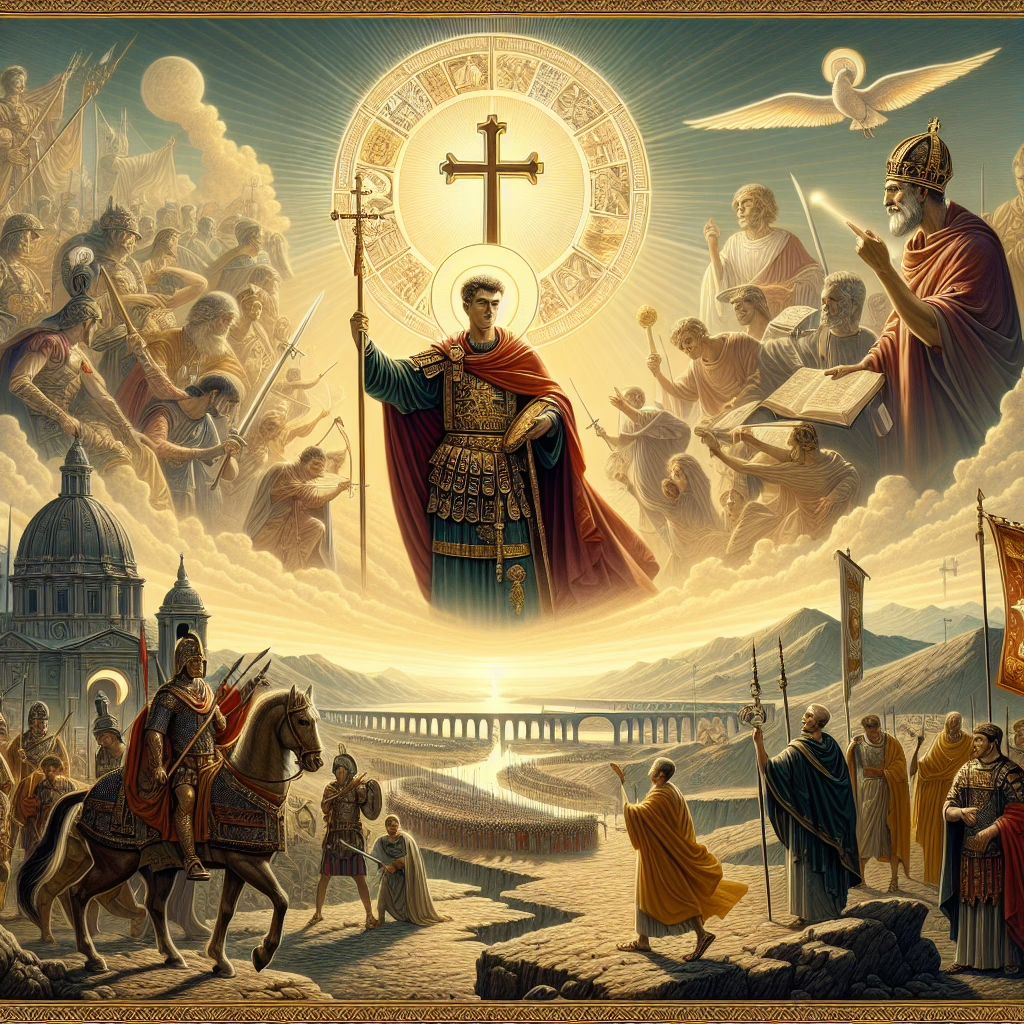The Life and Legacy of St. Constantine: A Pillar of Christian History
Introduction: The Transformative Journey of St. Constantine
"In hoc signo vinces" — a declaration etched into the annals of history, marking not only the conversion of a powerful ruler but the dawn of a new era for the Christian faith. The life of St. Constantine, also known as Constantine the Great, is a testament to the profound impact one individual can have on the trajectory of both the Church and the Roman Empire. This blog delves into the intricate tapestry of Constantine's life, exploring the key events, teachings, and the enduring influence of his legacy. Join us as we uncover the story of a man whose faith transformed not only himself but an entire civilization.
1. The Historical Context of St. Constantine's Life
1.1 Early Life and Family Background
Born around 272 AD in the region of present-day Serbia, Constantine was the son of Constantius Chlorus, a significant figure in the Roman political landscape. This lineage set the stage for his future role as emperor, offering a unique perspective on the intertwining of faith and power. Growing up during a time when the Roman Empire was vast yet fragmented, Constantine was exposed to diverse religious beliefs, including a burgeoning Christian faith that was often persecuted. These early influences would later shape his understanding of leadership and faith. For context on the political landscape he entered, see the contributions of early Roman emperors.
1.2 Rise to Power
The death of Constantius Chlorus in 306 AD paved the way for Constantine's ascension to power. The Roman Empire, already in a state of flux, was on the brink of a transformation. Constantine's rise was not merely a shift in leadership but a turning point with profound implications for the empire and Christianity alike. Under his rule, the integration of faith into the governance of the empire began, signaling a move towards religious legitimacy and tolerance.
2. Key Events That Defined His Reign
2.1 The Vision at the Battle of Milvian Bridge
One of the most pivotal moments in Constantine's life occurred shortly before the Battle of Milvian Bridge in 312 AD. As recorded by Eusebius of Caesarea, Constantine experienced a divine vision: a cross of light in the sky alongside the words "In hoc signo vinces" or "In this sign, conquer." This revelation became a cornerstone of his military strategy, leading to a decisive victory over Maxentius. The event became emblematic of Constantine’s faith, illustrating the profound influence of divine intervention on his leadership and further solidifying his commitment to Christianity.
2.2 The Edict of Milan
In 313 AD, Constantine and his co-emperor Licinius issued the Edict of Milan, granting freedom of worship across the empire. This edict marked an epoch in Christian history, allowing Christians, who were previously marginalized, to practice their faith openly. The introduction of religious tolerance not only dismantled an era of persecution but also set the groundwork for Christianity to flourish within the Roman Empire.
2.3 The First Council of Nicaea
Zeroing in on the theological challenges of his time, Constantine convened the First Council of Nicaea in 325 AD. This assembly sought to address the Arian controversy, a theological dispute regarding the nature of Christ. The council's resolution led to the creation of the Nicene Creed, a foundational statement of Christian belief that remains central in contemporary Christian worship.
2.4 Miracles and Divine Interventions
Apart from the vision at Milvian Bridge, the era inspired numerous narratives of divine intervention, underscoring Constantine’s connection to the divine. For further exploration of miracles in early Christian history, see Miracles of Early Saints.
3. Lessons from the Life of St. Constantine
3.1 Faith and Leadership
Constantine exemplifies a leader driven by faith, integrating his spiritual commitment into his imperial duties. His reign illustrates the delicate balance between secular authority and a devout Christian life. As Pope Benedict XVI once remarked, “In Constantine, the throne and the altar were united.” His life presents a template for modern leaders seeking to harmonize their faith with leadership roles.
3.2 Challenges and Opportunities
Navigating the challenges of his era, Constantine faced the immense task of uniting a divided empire while fostering a budding religion. His journey is a resilient example of transforming challenges into opportunities for personal and societal growth. Individuals today can draw inspiration from his perseverance, embracing their personal faith journeys as opportunities for deep-seated transformation.
3.3 The Nicene Creed as a Foundation of Faith
The Nicene Creed, established under Constantine’s guidance, continues to serve as a cornerstone of Christian doctrine. It offers a succinct summary of core Christian beliefs, crucial for unifying diverse Christian practices. For a thorough exposition, visit Understanding the Nicene Creed.
4. Prayers and Devotions Inspired by St. Constantine
4.1 Traditional Practices
Drawing from Constantine’s visionary moment, believers can engage in prayers for divine guidance. A sample prayer might be: "Lord, grant me the wisdom and courage to follow Your will…" The Nicene Creed remains a powerful declaration of faith, recited during Mass and personal devotion, anchoring the faithful in the legacy of Constantine's profound influence.
4.2 Contemporary Reflections
Reflecting on leadership inspired by Constantine's legacy, individuals are encouraged to meditate on integrating faith into their roles. In today’s context, prayers for religious freedom hold continued significance, ensuring the right to worship freely, a legacy of the Edict of Milan.
4.3 Community Involvement and Leadership
Constantine’s values continue to resonate in contemporary leaders who embody his principles in community service and leadership. Individuals are encouraged to engage in community service rooted in Christian values, emulating his devotion to faith and societal welfare.
Conclusion: The Enduring Legacy of St. Constantine
Recapitulating the life of St. Constantine, we see the extraordinary contributions he made to Christianity and the Roman Empire. His status as a seminal figure in Christian history is underscored by his unwavering commitment to faith, his pioneering of religious freedom, and the shaping of doctrinal foundations. As we journey forward, let us draw inspiration from Constantine’s life, embarking on our own faith journeys, committed to learning from his legacy.
Amazon Books:





